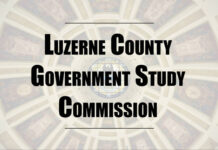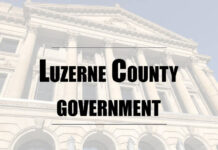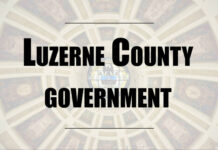Luzerne County Council is set to vote Tuesday on new fees county Coroner Jillian Matthews requested due to issues the office sometimes encounters with unclaimed bodies.
Under state law, counties are responsible for removing bodies when there is no next of kin or when the next of kin refuses to claim the body or accept responsibility for the deceased person’s final disposition, Matthews’ submission to council said.
During a work session earlier this month, Matthews told council the deputy coroners are sometimes called to long-term care facilities to pronounce the death of a facility resident because the facilities don’t have a doctor, registered nurse or certified registered nurse practitioner to perform that duty.
Taxpayers should not be required to fund a service caused by staffing issues at a private facility, she said.
The coroner’s office also has found some facilities are not maintaining their records to document the next of kin and funeral arrangements for residents, Matthews said. Upon the death of a resident, there have been discoveries that the next of kin is no longer alive or cannot be reached because the contact information on file was not updated, she added.
In such situations, the coroner’s office would then have to visit the facility to pronounce the death, remove the person and perform its own due diligence attempting to identify and reach the next of kin, she said. If this is unsuccessful, the person also must be buried at the county’s expense, she said.
After researching fees in other counties, including some struggling with this same issue, Matthews is proposing the following charges:
• $225 for a coroner’s office deputy to respond and investigate at the scene
• $350 to remove and transport the deceased
• $50 for administrative services attempting to identify the next of kin
• $750 for a burial, which is the amount the county must pay Maple Hill Cemetery in Hanover Township for a grave and unceremonious burial
• $20 per day for body storage
Matthews said the storage fee comes into play in rare situations when a funeral home does not retrieve the deceased in a timely fashion.
The coroner cited another unusual example in which an attorney had informed a family the body could not be claimed until the estate was administered — a process that could take months. She estimated that body was kept in the county morgue in Hanover Township for 27 days, describing the case as “totally unacceptable.” With a fee, the county could have recouped some reimbursement, she said.
Matthews said she learned issues with some long-term care facilities dated back to 2016 because past coroner William Lisman sent a letter to facilities that year.
Councilman Tim McGinley asked if there is an estimated revenue projection from the proposed fees.
Matthews said there is not because these types of calls are “not very often.” She estimated there are fewer than 50 such cases falling into these scenarios annually but stressed the county should not be on the hook.
If council approves the fee resolution, the coroner’s office must seek final authority to impose the fees from the county Court of Common Pleas.
A letter to nursing and medical facilities outlining the fees states they must keep intake forms complete and accurate regarding the next of kin and funeral home designations, the agenda said.
”This should be part of your facility’s business plan and reviewed frequently to ensure information is up-to-date. The Coroner’s Office is a taxpayer funded entity not responsible for devising and implementing postmortem care plans of the residents of long-term care facilities,” it said.
Before taking possession of a body as “unclaimed,” the Coroner’s Office will require facilities to show written documentation of attempts to contact next of kin, it said.
Reach Jennifer Learn-Andes at 570-991-6388 or on Twitter @TLJenLearnAndes.




